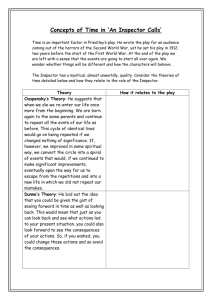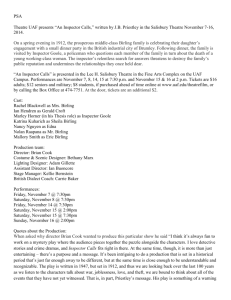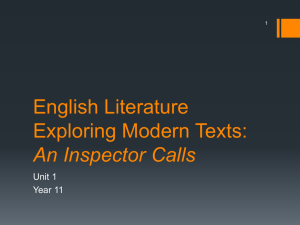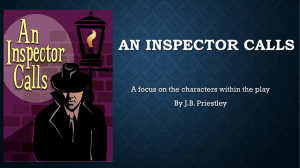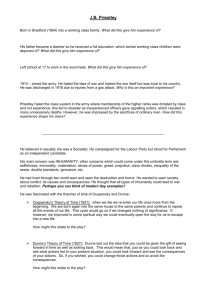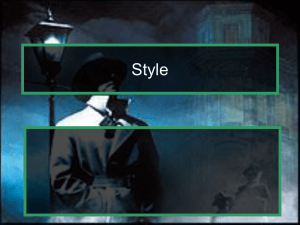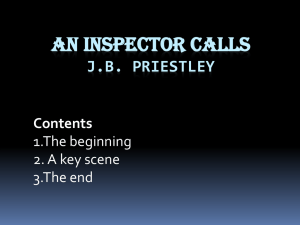Essay Question: In Act One of `An Inspector Calls` how does J
advertisement
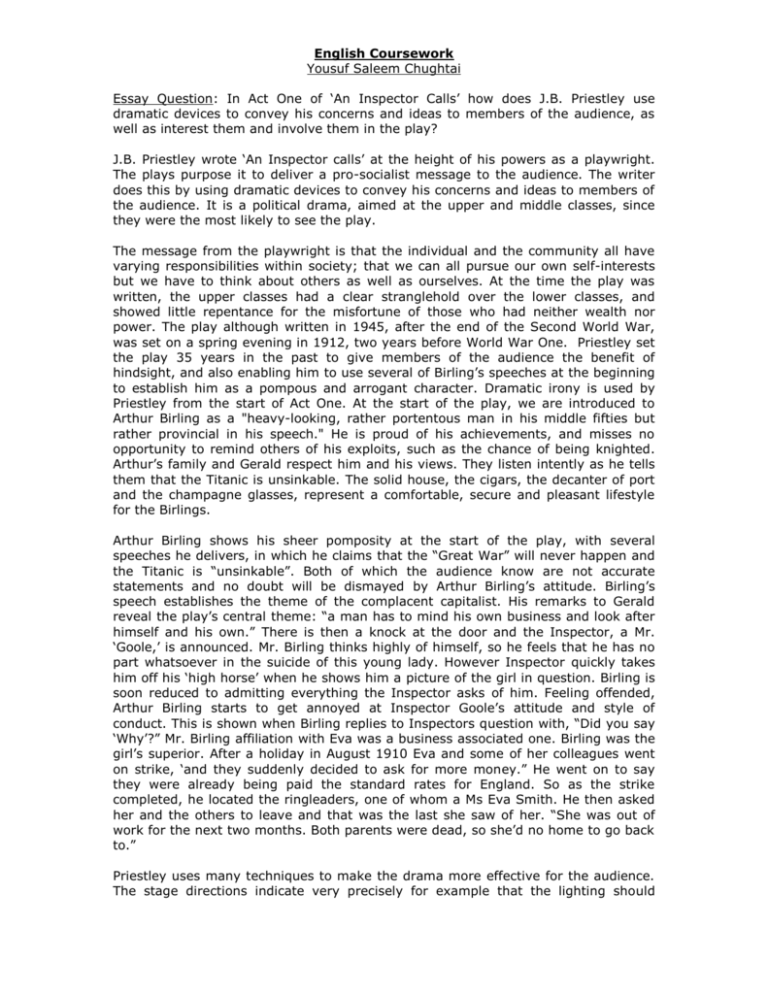
English Coursework Yousuf Saleem Chughtai Essay Question: In Act One of ‘An Inspector Calls’ how does J.B. Priestley use dramatic devices to convey his concerns and ideas to members of the audience, as well as interest them and involve them in the play? J.B. Priestley wrote ‘An Inspector calls’ at the height of his powers as a playwright. The plays purpose it to deliver a pro-socialist message to the audience. The writer does this by using dramatic devices to convey his concerns and ideas to members of the audience. It is a political drama, aimed at the upper and middle classes, since they were the most likely to see the play. The message from the playwright is that the individual and the community all have varying responsibilities within society; that we can all pursue our own self-interests but we have to think about others as well as ourselves. At the time the play was written, the upper classes had a clear stranglehold over the lower classes, and showed little repentance for the misfortune of those who had neither wealth nor power. The play although written in 1945, after the end of the Second World War, was set on a spring evening in 1912, two years before World War One. Priestley set the play 35 years in the past to give members of the audience the benefit of hindsight, and also enabling him to use several of Birling’s speeches at the beginning to establish him as a pompous and arrogant character. Dramatic irony is used by Priestley from the start of Act One. At the start of the play, we are introduced to Arthur Birling as a "heavy-looking, rather portentous man in his middle fifties but rather provincial in his speech." He is proud of his achievements, and misses no opportunity to remind others of his exploits, such as the chance of being knighted. Arthur’s family and Gerald respect him and his views. They listen intently as he tells them that the Titanic is unsinkable. The solid house, the cigars, the decanter of port and the champagne glasses, represent a comfortable, secure and pleasant lifestyle for the Birlings. Arthur Birling shows his sheer pomposity at the start of the play, with several speeches he delivers, in which he claims that the “Great War” will never happen and the Titanic is “unsinkable”. Both of which the audience know are not accurate statements and no doubt will be dismayed by Arthur Birling’s attitude. Birling’s speech establishes the theme of the complacent capitalist. His remarks to Gerald reveal the play’s central theme: “a man has to mind his own business and look after himself and his own.” There is then a knock at the door and the Inspector, a Mr. ‘Goole,’ is announced. Mr. Birling thinks highly of himself, so he feels that he has no part whatsoever in the suicide of this young lady. However Inspector quickly takes him off his ‘high horse’ when he shows him a picture of the girl in question. Birling is soon reduced to admitting everything the Inspector asks of him. Feeling offended, Arthur Birling starts to get annoyed at Inspector Goole’s attitude and style of conduct. This is shown when Birling replies to Inspectors question with, “Did you say ‘Why’?” Mr. Birling affiliation with Eva was a business associated one. Birling was the girl’s superior. After a holiday in August 1910 Eva and some of her colleagues went on strike, ‘and they suddenly decided to ask for more money.” He went on to say they were already being paid the standard rates for England. So as the strike completed, he located the ringleaders, one of whom a Ms Eva Smith. He then asked her and the others to leave and that was the last she saw of her. “She was out of work for the next two months. Both parents were dead, so she’d no home to go back to.” Priestley uses many techniques to make the drama more effective for the audience. The stage directions indicate very precisely for example that the lighting should English Coursework Yousuf Saleem Chughtai change from “pink and soft” to “brighter and harder” on the arrival on the inspector. This could suggest that the respectability of the family is going to be stripped away and their secrets will be exposed. It could also show an inquisition effect on the family. The ‘pink and soft’ lighting suggests the veil of intimacy that cover the family, that is always there waiting to be taking away. The fact that the lighting changes show what a massive impact the entrance of the inspector has, despite not needing to be a big man; he instantly creates an ‘impression of massiveness’. The doorbell is used as a sound effect. This is dramatically effective because the shrill, sharp sound of the doorbell creates the impression that the Birlings cocoon of intimacy is being pierced. This is the warning shot fired by Priestley, letting the Birlings know their cocoon of intimacy is under attack. Priestley uses the inspector as a mouthpiece, to voice his concerns, Priestley’s stage direction says that ‘the inspector need not be a big man, but instantly creates an impression of massiveness’. By using this stage direction, he is trying to show that anyone, no matter what size, can have as socialistic impact on those higher up on the social ladder. He instantly adopts a moralizing tone, and continues to hamper characters from the very beginning. By doing this, we see that the length of Birlings speeches decrease rapidly, and therefore making it clearer that Birling begins to feel threatened by the Inspector. He also is the voice of social conscience in the play, and often sounds like a prophet or some form of higher power. One of Priestley’s innermost themes in the play is stressed; that is there is no apparent dividing line between varied elements in society. We can’t just write one division of as criminals and see another division as upright citizens. Gerald claims that ‘we’re respectable citizens not criminals’ To whom the Inspector replies ‘Sometimes there isn’t as much difference as you think’. We are all part of civilization and we need to share tribulations and difficulties, good fortune and relief. We need to accept some quantity of liability for others. Just as the Inspector enters, Gerald tells Birling that the Inspector may be visiting the Birlings because ‘Eric’s been up to something’. Eric feels ‘uneasy’ about this and this suggests that he may have something to hide. Priestly builds up tension before the inspector even arrives on stage. He has created a sense of bogus security in the tranquil dinner party but has also sporadically introduced a note of tension. By doing this the keeps the spectators on their toes. The fact that the inspector only shows the photograph to one person at the time, raising uncertainty it might be separate women, doesn’t matter at all. The moral point is made productively, and it impacts cruelly upon Eric and Sheila, however, it has little impact on Birling and his wife. This shows how the youth of the time were susceptible to social change, as it was going on all around the world. From this early stage the inspector is presented by Priestly as more than a mere policeman. He becomes social commentator, philosopher, judge and jury. Birling is an ignorant capitalist, and tells us what he thinks of communists, as the claims communist Russia will always be ‘naturally behind’ the rest of the world. Eva Smith represents every working class woman in England. The name Eva, is similar to the name ‘Eve’ (the first woman ever according to Genesis), and Smith is the most common surname in England. The inspector has a concrete motive to leave the stage just before the curtain falls. It gives Sheila time to get the truth out of Gerald. Giving the inspector the final word of the act is dramatic and gives the audience a lot to anticipate. The inspector is proficient at getting people to condemn themselves. He gets Gerald to propose that young women should be ‘protected against unpleasant and disturbing things’ and then says, ‘Well, we know one young English Coursework Yousuf Saleem Chughtai woman who wasn’t, don’t we?’ The inspector’s role as some sort of mystic, allknowing power is toughened when he explains to Gerald why Sheila wishes to stay to hear his declaration of guilt. His comment ‘If nothing else, we’ll have to share our guilt’ has universal significance and is not limited to the immediate concerns of the family. Sheila’s approval of the inspector’s power grows in the final Act. She seems to perceive his super-human qualities when she says to him, ‘I don’t understand you.’ The inspector’s observation to Mrs. Birling about young people – ‘They’re more impressionable’, adds weight to the audiences feelings that the older generation is unchanging in its attitudes and that if society is to become more thoughtful and more just it will have to be through the efforts of the youth. Another major theme appears. Sheila says to Eric, ‘But we really must stop these silly pretences’. Priestly is saying that we all tend to hide our weaknesses from ourselves – which the veneer of pretence needs to be excluded from society. It is in this Act that the inspector strips away their veneer of respectability, though the elder Birlings do not yet realize it. The audience is supposed to feel that it is not only the Birling family which is on trial. Men like Alderman Meggarty, from an honored social position, also treated Daisy Renton badly. In one sense, the whole society is on trial. A lot is meant to be inferred from Charlie Brunswick’s lending of his rooms to Gerald. They were almost certainly meant for taking women back to. This reveals a lot concerning the attitudes of the men about town from this social class. There is some expansion in the relationship between Gerald and Sheila – it moves from the romantic illusion to a more pragmatic understanding of each other. In concluding, I feel that the message of the playwright is still relevant to society today. The playwright changes the audience’s opinion of the Birlings, by using the Inspector to voice his concerns. Word Count: 1556
